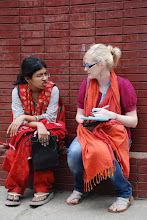In Australia we put refugees and asylum seekers (those who have been forced to leave their home and country, in most cases without the time to apply for refuge) behind big brick walls and barbed wire. We do not afford them the illusion of freedom.
In Bangladesh, there are no big walls, no barbed wire. But that doesn’t mean they aren’t prisoners.
For the last 17 years the Rohingya refugees of Myanmar have sought safety on Bangladeshi soil. Their crime? Being a Muslim minority. Their punishment? Denied citizenship, torture, imprisonment and death.
In the south-eastern corner of the Bangladesh, which shares a border with Myanmar, two refugee camps (Kutapalong and Nayapara) house more than 28,000 refugees. But another 30,000 ‘unregistered’ refugees are barely surviving in two nearby makeshift camps.
The Government of Bangladesh hasn’t ‘registered’ a single new refugee since 1992, other than to record births. They argue that Bangladesh is a developing country and has a lot to do to help its own people before it can effectively help others.
More than 230,000 refugees have been repatriated (between 1992 and 2006) amidst accusation of coercion. The government has refused to recognise subsequent Rohingya refugee arrivals since 1991 and has prohibited their access to Kutapalong and Nayapara camps. Officially, the Bangladesh Government supports repatriation. But convincing refugees to want to return to Myanmar and probable death is a hard sell. Forced repatriation is a better way to describe the government’s policy on this. But with a high number of seasonal migrant workers crossing the border each day and corruption as it is, slipping a few taka to the Bangladesh Rifles (BDR – border guards) to make it back across into Bangladesh and comparative safety is a small price to pay, even for those with nothing.
In Bangladesh, although there is no national legislation governing the administration of refugee affairs, refugees are not legally entitled to work and do not even have the right to own property. Domestic violence in the refugee camps is widespread (and not illegal in Bangladesh) and polygamy is prevalent. Food shortages and malnutrition are serious problems, heightened by insufficient medical support and staff. Accommodation (semi-permanent structures built in 1992) are overcrowded and in serious need of repair. UNICEF is providing primary education (national government curriculum, plus Burmese) but secondary education is not permitted. But with only a small fraction of refugees offered resettlement in countries including Australia, Canada, India, the Gulf States, Japan, Malaysia, Pakistan, Saudia Arabia, Thailand, UAE and the UK, there is little reason for them to hope for a life beyond the confines of the camp.

Children enjoy school time at Kutapalong camp.
Around 60% of refugees in Kutapalong and Nayapara are children. Children who have never set foot out of the camp. Children who know they can’t go home (don’t want to) and who speak better Bangla than they do Burmese.

Children at Nayapara camp practice their English with me during a visit to see UNICEF's National Vitamin A campaign.
There is a host of UN agencies and NGOs working to support these refugees, but without any tangible and realistic support from the government, there is only so much that can be done and it’s not enough.
It’s not nearly enough.
